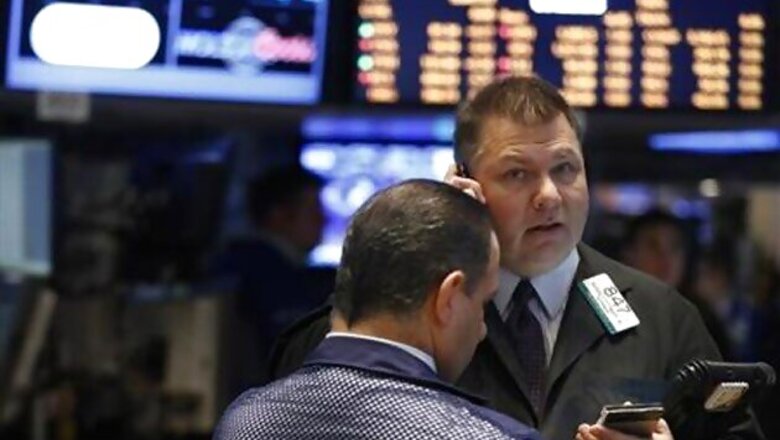
views
Tokyo: Asian shares took their lead from overnight plunges in global equities to fall on Tuesday as an apparently inconclusive election outcome in Italy raised fears of a resurgent euro zone debt crisis. Italy's centre-left coalition will win a majority in the lower house of parliament but the upper house will be deadlocked, the Interior Ministry said on Tuesday after almost all votes were counted. No party or coalition won a majority of seats in the Senate, which a government would need to pass legislation.
A split parliament in the euro zone's third-largest economy is seen as likely to paralyse any new government and potentially reignite the euro-zone debt crisis. "There's a possibility that the Italians might be heading back to the polls. In the short term, investors and traders don't like the uncertainty," said Ben Le Brun, market analyst at OptionsXpress in Sydney.
The yen and the euro stabilised while London copper and gold gained, and Asia's overall equities losses were limited compared to their global peers, such as US benchmark Standard & Poor's 500 Index which suffered its worst one-day percentage decline since November 7 with a 1.8 per cent tumble on Monday.
The MSCI's broadest index of Asia-Pacific shares outside Japan fell 0.5 per cent. Australian shares fell 0.7 per cent, South Korean shares eased 0.4 per cent while the Philippines stock market plunged 1.2 per cent after a record finish on Monday. "There's an argument going on among traders at the moment. Was the Italian election result a cause or an excuse for something the market wanted to do? Because the market has run so hard we were due for a pull-back," said Michael McCarthy, chief market strategist at CMC Markets. Australian shares last week scaled a 4-1/2-year high.
The yen resumed its retreat after firming sharply on Monday when nervousness about Italy exposed the yen to sharp reversals from its recent steep losses on bets of aggressive reflationary monetary policy in Japan. The yen traded down 0.6 per cent against the dollar at 92.35 after gaining 2 per cent to a three-week high of 90.85 on Monday from its intraday low of 94.77 touched earlier in the day, its lowest since May 2010. The yen was also down 0.5 per cent against the euro to 120.87 after jumping more than 3 per cent to 118.74 on Monday from its day's low of 125.36.
Traders said the plunge in the dollar and the euro against the Japanese currency has provided fresh opportunities to buy these currencies against the yen, with many market players still seeing a weak yen trend continuing.
But the euro's rebound was limited, putting the single currency near its more than six-week low of $1.3047 hit on Monday on jitters about political gridlock in Italy hampering the country's efforts to reform and slash its debts.
"Uncertainty over the Italian election outcome and its impact will certainty keep the euro under strong pressure for some time," said Yuji Saito, director of foreign exchange at Credit Agricole in Tokyo.
"A safety net has been provided over the past year in the euro zone and given the size of Italy's economy, I doubt that the situation will turn into a disaster, but we need to carefully monitor developments. It revives memories of risks in the euro zone," Saito added.
The focus will now be on an Italian treasury bill auction on Tuesday when borrowing costs could rise, given the Senate election result.
The yen's overnight appreciation hit Japan's Nikkei stock average, with the index declining 1.4 per cent after closing at a 53-month high the day before.
Investors also await testimony later in the day from Federal Reserve Chairman Ben Bernanke for further clues of when the Fed intends to slow down or stop its bond-buying programme.
Financial markets were rattled last week by minutes of the Fed's January meeting showing some Fed officials were mulling scaling back its strong monetary stimulus earlier than expected.
"Bernanke's testimony will likely drive global market sentiment tonight, as markets wait for clues on the Fed's exit strategy for its bond-buying stimulus program. Our house view is that Bernanke will remain dovish," ANZ said in a note.
Ahead of Bernanke's appearance, Dennis Lockhart, president of the Federal Reserve Bank of Atlanta, said on Monday that US economic growth could surpass expectations this year, but an anaemic labour market requires ongoing support from monetary policy.
The United States also faces downside risks to its economy if $85 billion in government-wide "sequestration" spending cuts go ahead on March 1.
US crude slid 0.6 per cent to $92.54 a barrel and Brent fell 0.5 per cent to $113.86.
Spot gold inched up 0.2 per cent to $1,596.56 an ounce.


















Comments
0 comment